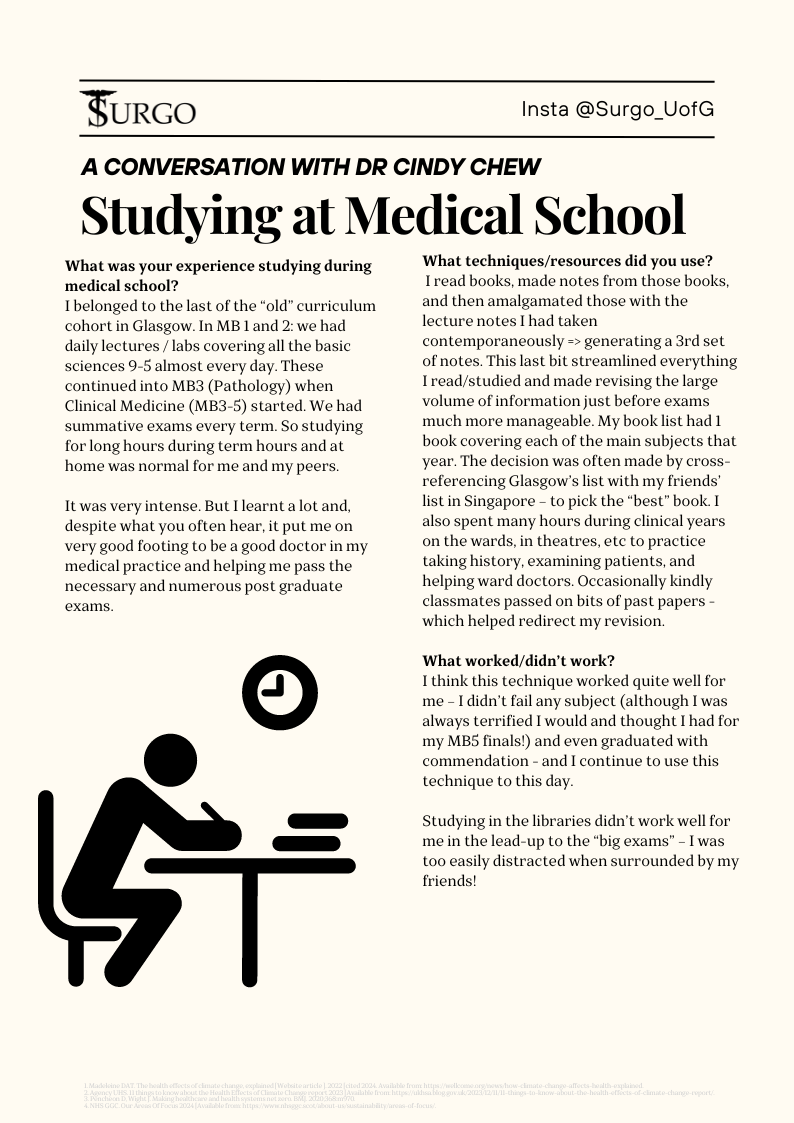Studying at Medical School
A Conversation With Dr Cindy Chew
DOI:
https://doi.org/10.36399/Surgo.2.317Abstract
What was your experience studying during medical school?
I belonged to the last of the “old” curriculum cohort in Glasgow. In MB 1 and 2: we had daily lectures / labs covering all the basic sciences 9-5 almost every day. These continued into MB3 (Pathology) when Clinical Medicine (MB3-5) started. We had summative exams every term. So studying for long hours during term hours and at home was normal for me and my peers.
It was very intense. But I learnt a lot and, despite what you often hear, it put me on very good footing to be a good doctor in my medical practice and helping me pass the necessary and numerous post graduate exams.
What techniques/resources did you use?
I read books, made notes from those books, and then amalgamated those with the lecture notes I had taken contemporaneously => generating a 3rd set of notes. This last bit streamlined everything I read/studied and made revising the large volume of information just before exams much more manageable. My book list had 1 book covering each of the main subjects that year. The decision was often made by cross-referencing Glasgow’s list with my friends’ list in Singapore – to pick the “best” book. I also spent many hours during clinical years on the wards, in theatres, etc to practice taking history, examining patients, and helping ward doctors. Occasionally kindly classmates passed on bits of past papers - which helped redirect my revision.
What worked/didn’t work?
I think this technique worked quite well for me – I didn’t fail any subject (although I was always terrified I would and thought I had for my MB5 finals!) and even graduated with commendation - and I continue to use this technique to this day.
Studying in the libraries didn’t work well for me in the lead-up to the “big exams” – I was too easily distracted when surrounded by my friends!
Now being on the other side, how would you recommend students study/find the study technique that works for them?
I think that medical students are clearly expert study-ers and exam-passers to have made it to Medical School. They all know how to study.
The trick is, I think, being (1) consistent, (2) systematic, and (3) methodical in your approach. Do a little bit of work every day. Build a timetable around how covering what you need might look like and take it from there. Try and study in a way that makes sense within the subject, so new information and knowledge can build layer by layer logically. For this reason – I think having books help provide that structured way of learning. Also – learn with friends/classmates. Not only is it more sociable, fun, and good for your mental health – they are also great for filling in gaps you didn’t know you had!
In terms of prioritizing what to study first/most when “everything is important” – that is where spending time on the wards, speaking to real doctors, senior year students, finding mentors, and reaching out to wider networks of students and other stakeholders really come into their own. The latter has never been easier with the advent of the internet and consequent open access to so many resources.
What are the common pitfalls you see students falling into when it comes to studying in medical school?
A common one is studying for exams using past papers or MCQ books. Remember: medicine is a vocation where even consultants are continually learning, building on basic foundational knowledge. So the short-term “efficient” learning to pass medical school exams is not sustainable and not a good way to learn how to be a good doctor.
Another is thinking you can “learn everything by highlighting every line” in a paper/book/notes. The act of highlighting itself does not transfer knowledge from the book into either your short or long-term memory. It is really by interacting with the item to be learned, that makes it meaningful and allows it to embed as knowledge and learned memory. Dr Carolina Kuepper-Tetzel expands on this more eloquently in this BBC piece: https://www.bbc.co.uk/bitesize/articles/z8vhfdm
Resources - Try reading a little every day instead of cramming for exams and work towards MLA’s syllabus (https://www.gmc-uk.org/-/media/documents/mla-content-map-_pdf-85707770.pdf)

Published
Versions
- 2024-09-17 (2)
- 2024-09-15 (1)

